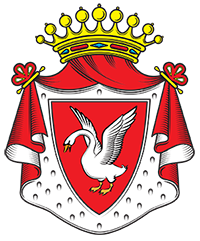Dunins, whose roots date back to the Middle Ages, are one of the oldest noble families in Poland. Family tradition claims that they are descendants of Canute the Great, the king of Denmark and the grandson of Mieszko I, one of the most powerful rulers in Europe in the 11th century. Their arrival in Poland is estimated to be in the 10th or 11th century, during a period of active relations between Poland and Scandinavia.
The progenitor of the family was the close advisor of King Bolesław III Krzywousty, Piotr Włostowic. His grandfather, Włost or Włast, came to Silesia from Denmark. Piotr’s grandfather received Silesian villages for his services to the duke, indicating his prominence as a knight, as this grant is one of the oldest known endowments made by dukes to knights.

For capturing the Ruthenian prince Wołodar in 1120, Piotr Włostowic was granted Gniazdo Skrzyńskie and a complex of estates in Książ Wielki by Bolesław III Krzywousty. The capital of Gniazdo Skrzyńskie, Comitum Skrinnensium, consisting of several dozen villages, was Skrzynno.
From that time, the proper surname was comes in respct. de Skrzynno, as the Dunin surname began to be officially used only in the 14th century, from the chancellor Andrzej of Skrzynno Dunin. In earlier centuries, Dunin was a nickname or epithet, which became a battle cry for the family.
Over time, Dunin completely replaced de Skrzynno, but - de Skrzynno - has survived as an epithet in the family line to this day.
Dunin family is also called Swans due to their coat of arms featuring a swan. This bird symbolizes delicacy, elegance, nobility, as well as courage and strength. It is not only a recognizable emblem but also reflects the values that the Dunin family has always upheld. It expresses moral and ethical ideals that they have embraced and reminds of the importance of maintaining dignity and loyalty in their actions for the homeland and society.
The Dunin family has always been deeply involved in social and Polish affairs. Initially, they held knightly positions and key roles in the service of Polish princes and kings. They actively participated in battles and campaigns, defending Polish land against foreign invasions. They often held high positions in state administration, church, army, and diplomacy.
For many years, they sat among senators, they were holding positions such as castellans, dignitaries, and various offices like instigators, regents, chancellors, grand hetmans of the crown, grand marshals, deputies to the Sejm, voivodes, starosts, abbots, archbishops, ensigns, and were also Knights of the Order of the White Eagle, Knights of the Legion of Honour, Knights of the Order of St. Lazarus, Knights of the Order of St. Stanislaus, Dames of the Order of the Starry Cross, as well as recipients of the Cross of Valor and many other decorations.
In the 19th century, the Dunin family actively participated in the struggle for Poland's sovereignty during turbulent national uprisings and the activities of independence organizations. Many family members were injured, many lost their lives, but they always remained loyal to Polish identity and independence, ready to sacrifice everything for their country. The motto adopted centuries ago by the Głębowice branch of the Dunin family is Dulce et decorum est pro patria mori - Sweet and honorable is it to die for one's country.
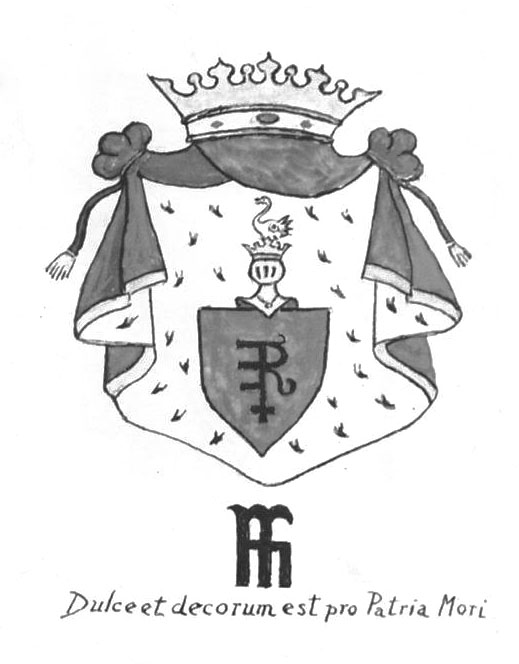
The Swan coat of arms with the P.E.T.R. emblem used in the early centuries, along with the motto adopted by the Głębowice branch of the Dunin family: Dulce et decorum est pro Patria Mori - Sweet and honorable is it to die for one's country.
During times of peace, many members of the family held important positions in administration, culture, science, and business. Their involvement in social, educational, and cultural initiatives, as well as their passion for charitable activities and the preservation of national heritage, contributed to the development of local communities and Poland as a whole. They founded several villages and towns, including Dunino Den in Scotland, Duninów in Lower Silesia, Nowy Duninów, Stary Duninów, Duninów Duży in Mazovia, Duninów gifted to Jagiełło in 1410 after the Battle of Grunwald, and Antoniny in Volhynia (named after Antonina Dunin). The Dunin family was granted the title of Count of the Holy Roman Empire by Emperor Ferdinand I Habsburg in 1547. This title was confirmed during the Saxon period and in the post-partition period in Galicia and the Kingdom of Poland.

THE ESTATES OF SWANS
The Swan Family owned their estates in Silesia, Kuyavia, and on the border between Mazovia and the Kraków-Sandomierz lands, with their main residence in Skrzynno (modern-day Mazowieckie Voivodeship).
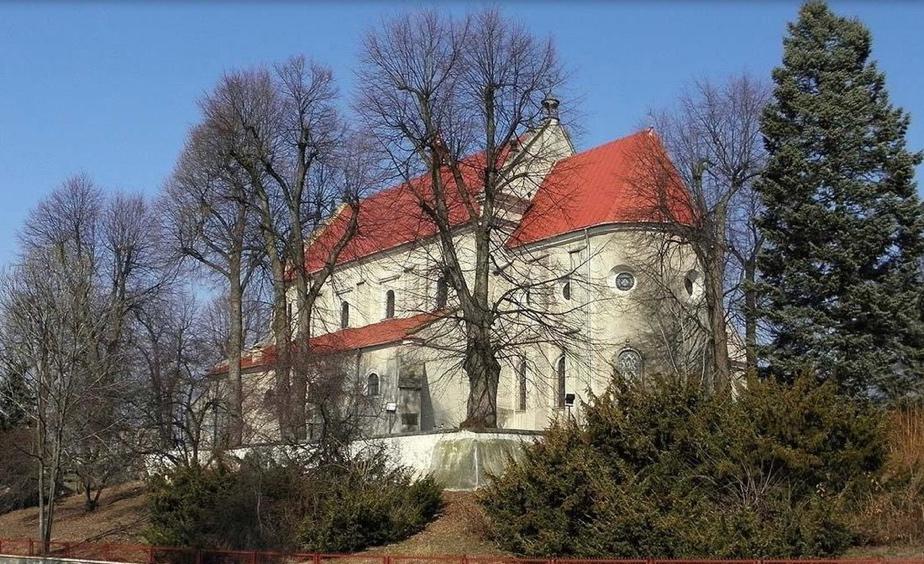
The Church in Skrzynno and the commemorative plaque of the Dunin family with the Swan coat of arms and the inscription: In memory of the grant by Bolesław III Krzywousty of Skrzynno and its surrounding estates to the Swan-Dunin family.
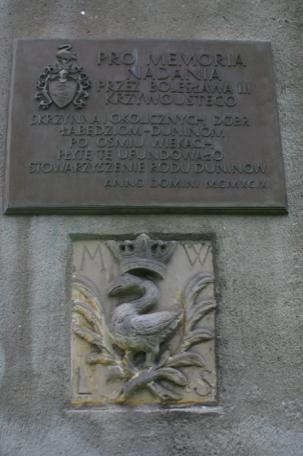
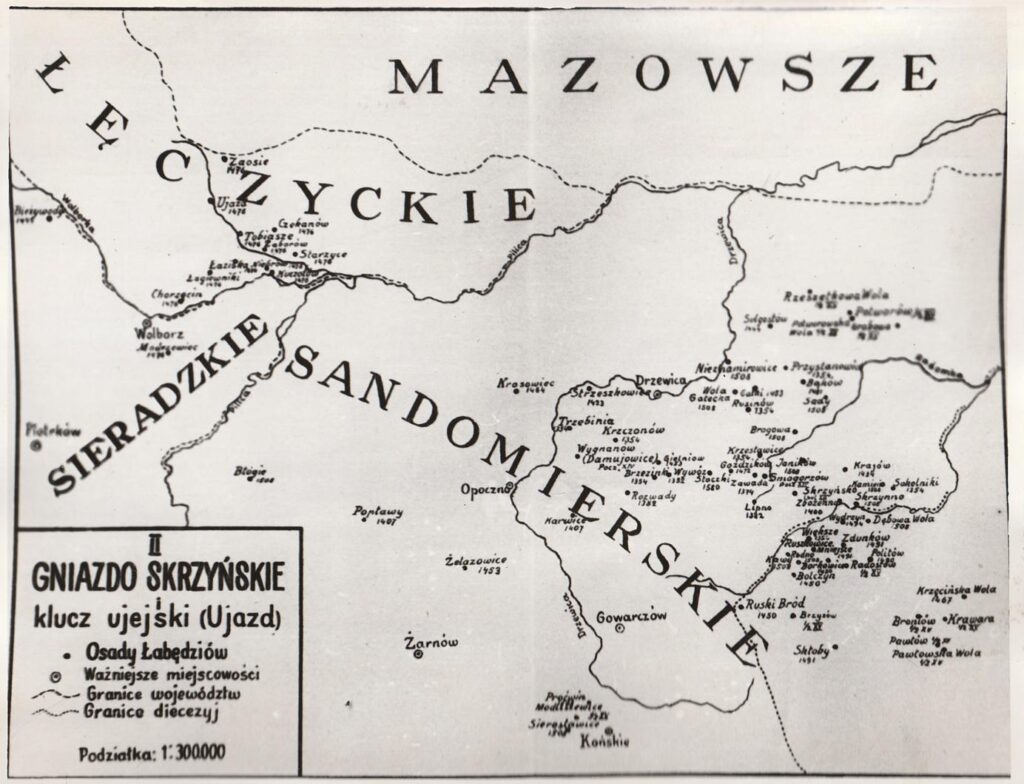

The dispersion of the Swan family in the Middle Ages.
During the time of Piotr Włostowic, the most important complex was Wrocław and its surroundings, where in a key area of the city Piotr had his residence and where nearby he founded the Benedictine Abbey in Olbin, whose name derives from the Proto-Slavic word olbąć or olbądź, meaning swan.
The known Wrocław estates of the Swan family seem to form a cohesive whole with the Ostrowia area. It appears likely that this family was once the exclusive owner of these lands, holding supreme authority in the Ślężanie community. If we consider that Góra Ślęża (Mount Ślęża-Sobótka was the first known seat of the Swan family), a center of tribal worship, was also owned by members of this family, it suggests that the ancestors of the Swan family were likely able to consolidate not only political but also religious authority in their hands – as mentioned by Stanislaw Bieniek.
In the Głębowice area, the Dunin family from Skrzynno appeared in the 18th century, when in 1778 Fryderyk Piotr Dunin purchased the Zator county office. During the same period, Jerzy Wojciech Dunin, owner of the neighboring Gierałtowiczki, had a son named Ludwik who in 1826 bought Głębowice from Jan Pisarzowski.
THE DUNIN ESTATES AFTER THE PARTITIONS OF POLAND
While the Dunin family did not suffer significant losses in the Austrian partition, in the Russian partition where their substantial estates were located in the Opoczno and Radom counties, dating back to Piotr comes de Skrzynno, as well as on the eastern borders of Poland, they were almost entirely deprived of their properties. The fact that these estates were considerable is evidenced by their inclusion in the Confiscation list of the estates of three families: the Radziwiłł, Potocki, and Dunin.
The Dunins did not regain their confiscated fortunes, and furthermore, their largest estates that could have been retained under Austrian rule passed out of the family due to the lack of a male heir.

The oldest estates of the Swan family in Silesia
